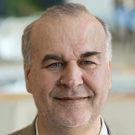Date
Cost
Free and open to the public
Location
Physical Science Building, Room 161
Description
Nanotechnology is offering unprecedented tools to medicine over the last few years. The extensive use of nanoparticles for therapy and/or diagnostics has unveiled a new generation of nano-biomaterials for medical applications. The general trend is towards the development of bioactive rather than bio-inert materials, with materials directly triggering or participating to cellular reaction pathways. Nanostructured oxides play also an important role in this scenario, and not only as inert materials as one would expect. Recently, cerium oxide nanoparticles (nanoceria) have been recently reported to show outstanding biomedical activity, acting as well tolerated anti-age and anti-inflammatory agents, and potential pharmacological applications due to redox changes in the Ce oxidation state (Ce4+/Ce3+) that trigger the abatement of intracellular reactive oxygen species (ROS), hindering the oxidative stress cytotoxic effects. The search for reliable and effective antioxidant therapy is a focus of current pharmacological research, since many serious diseases imply oxidative stress. However, the comprehension of the biological antioxidant mechanisms of nanoceria is at an early stage and controversial results are reported in the literature. This talk will summarize our recent studies on the antioxidant effects of nanoceria. It was found that nanoceria reduce the oxidative status and the extent of damage-induced apoptosis, including DNA-damaging agents, metabolic inhibitors, X-ray exposure, UV irradiation and oxidations.
Presenter

Enrico Traversa, Ph.D.
Division of Physical Sciences and Engineering
King Abdullah University of Science and Technology (KAUST)
Thuwal, Saudi Arabia
More information
Light refreshments will be served
Contact
Ushaben Lal NanoScience Technology Center 407-882-0032 usha@ucf.edu